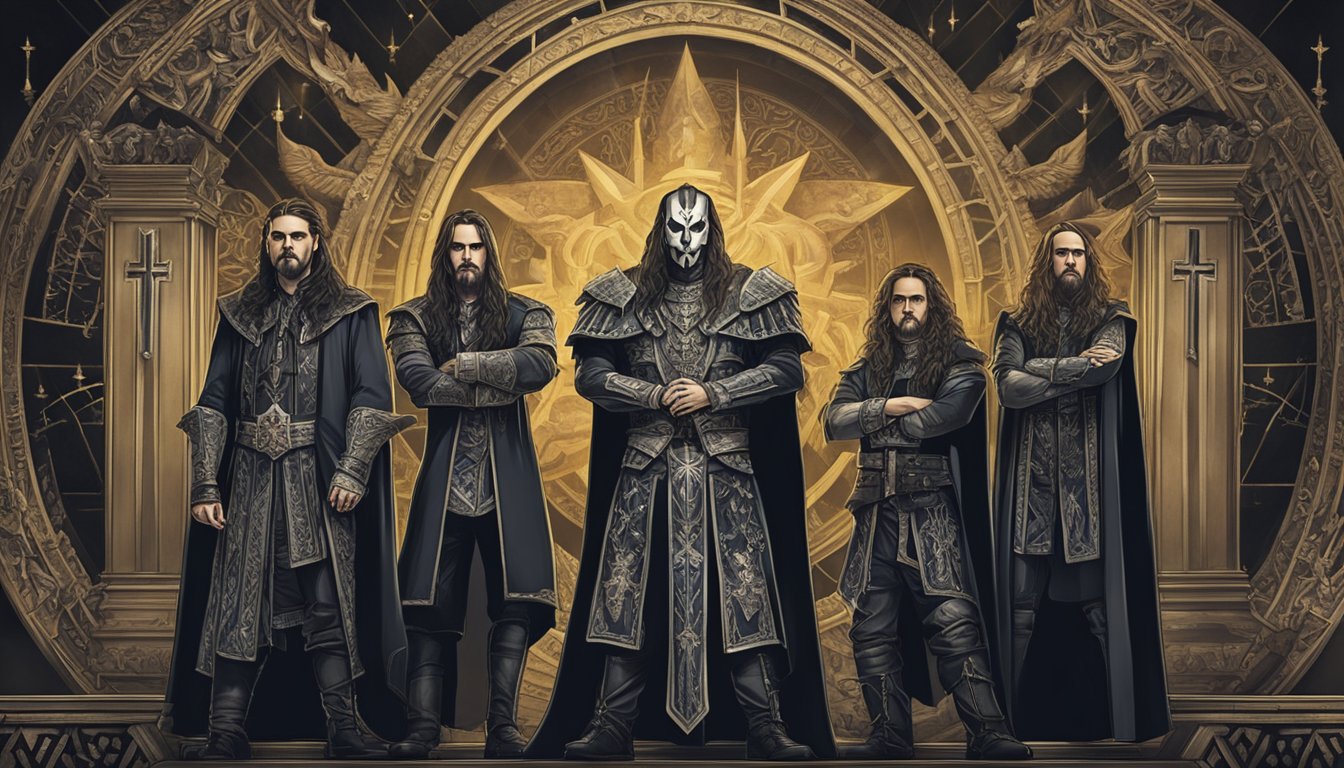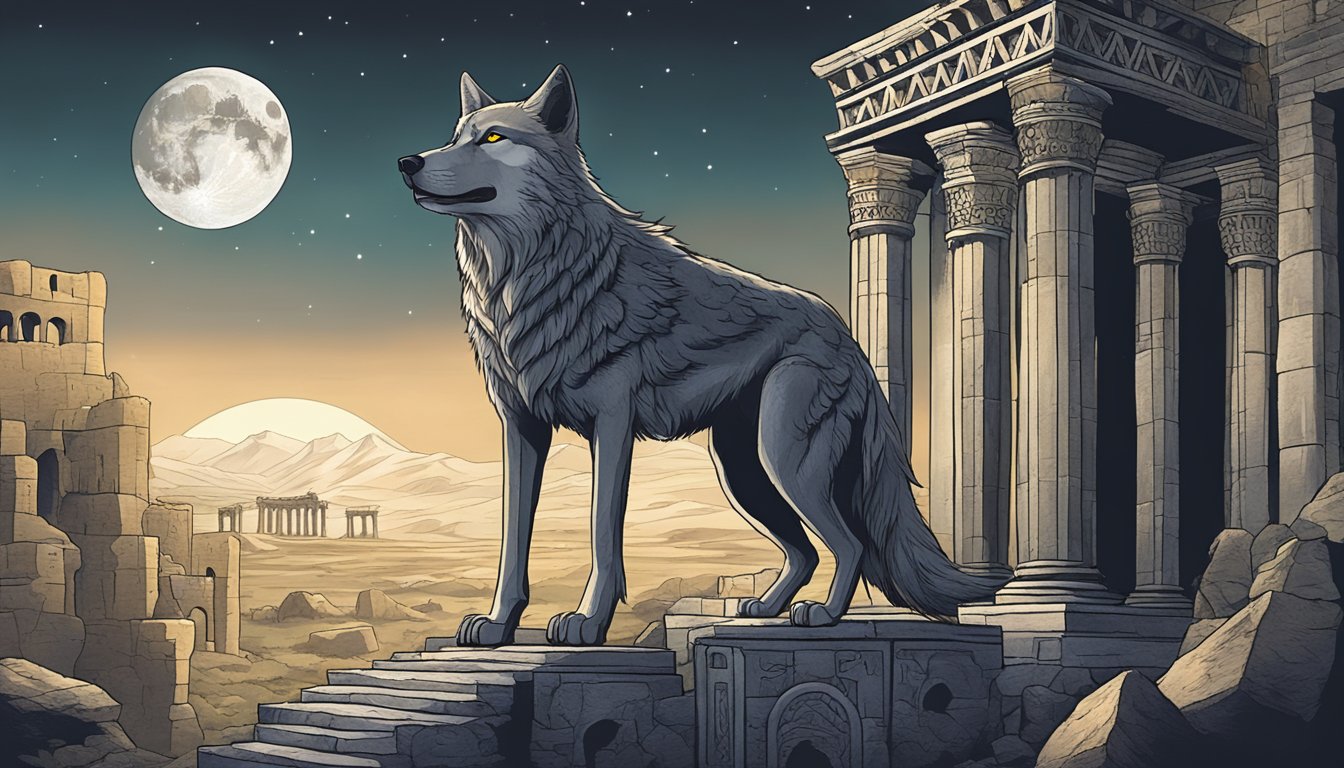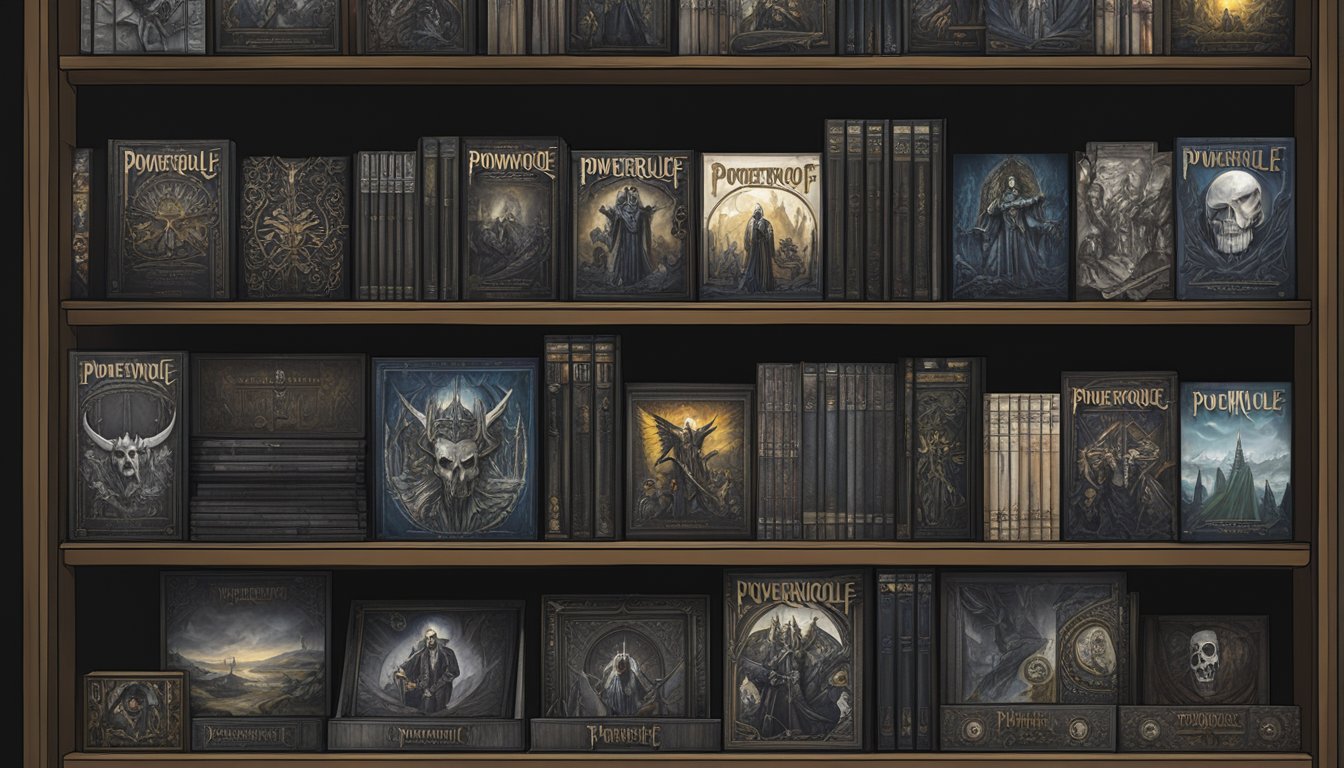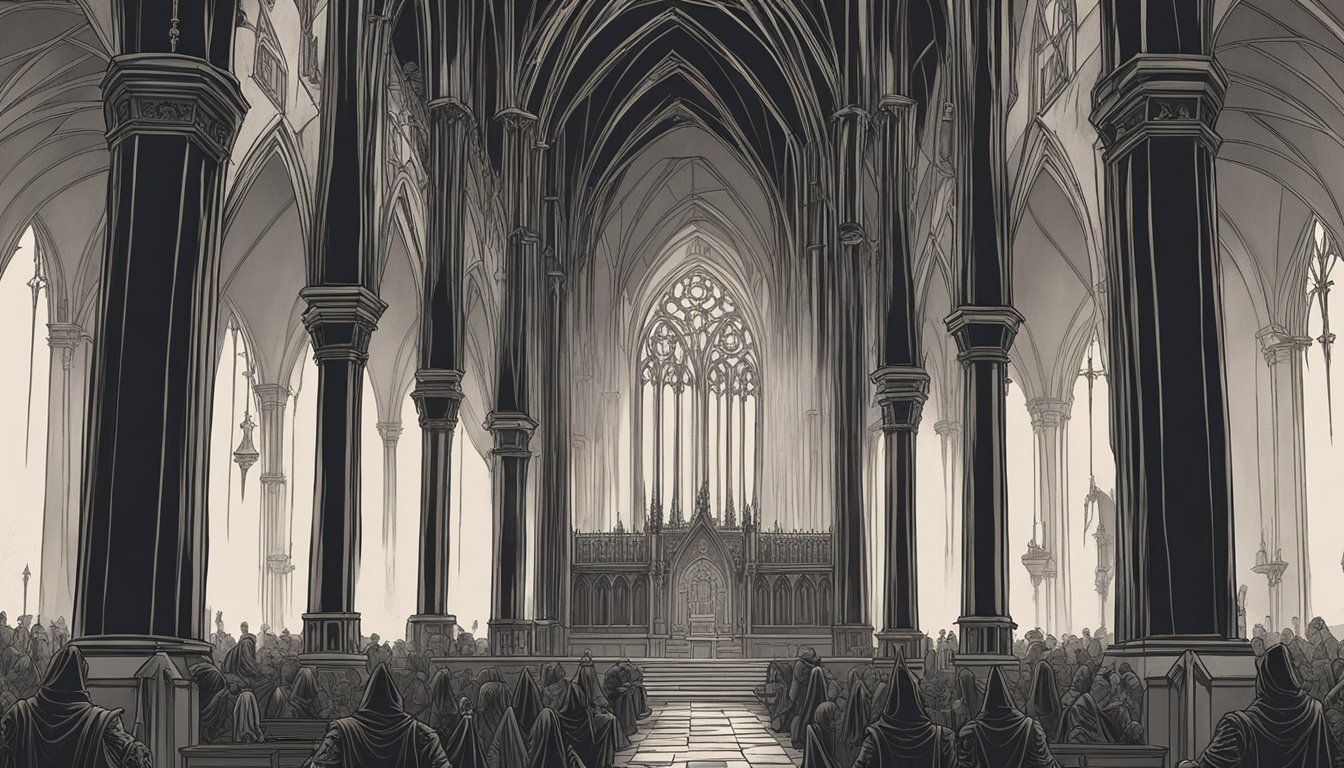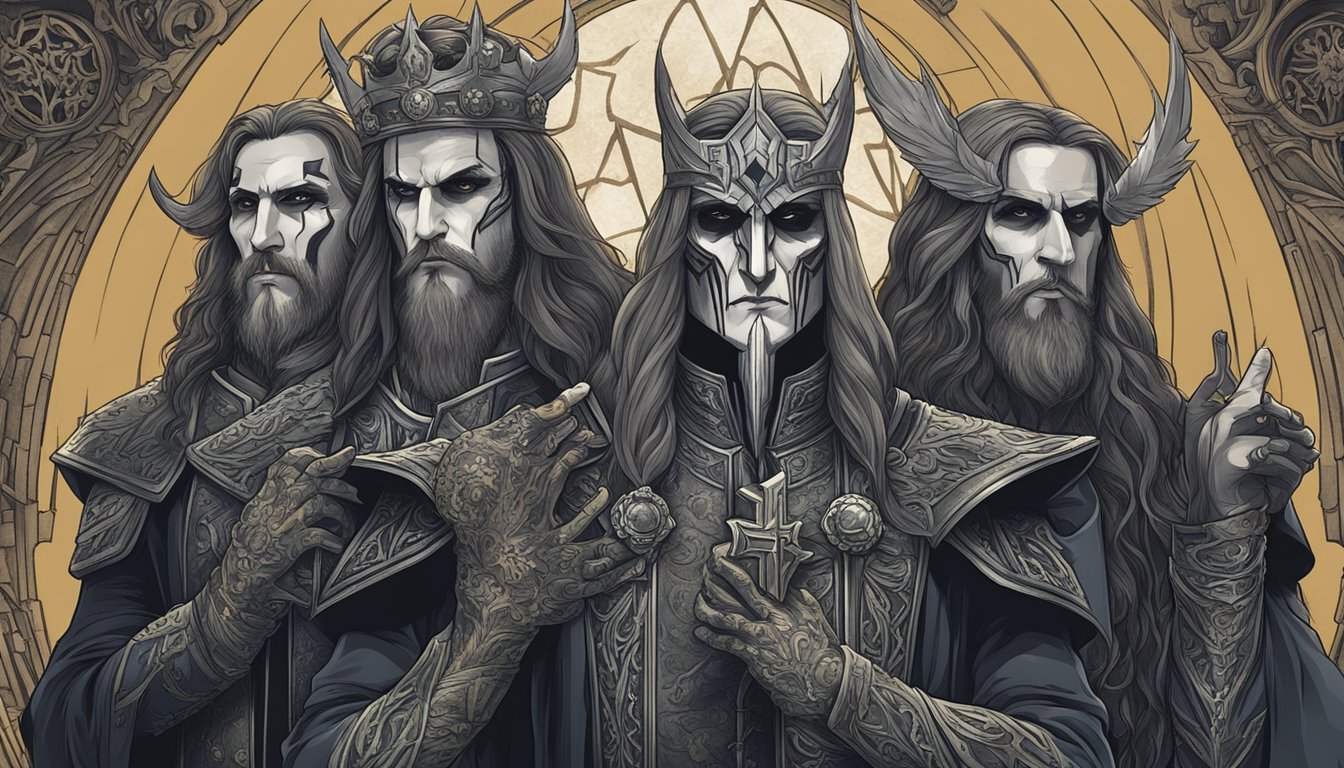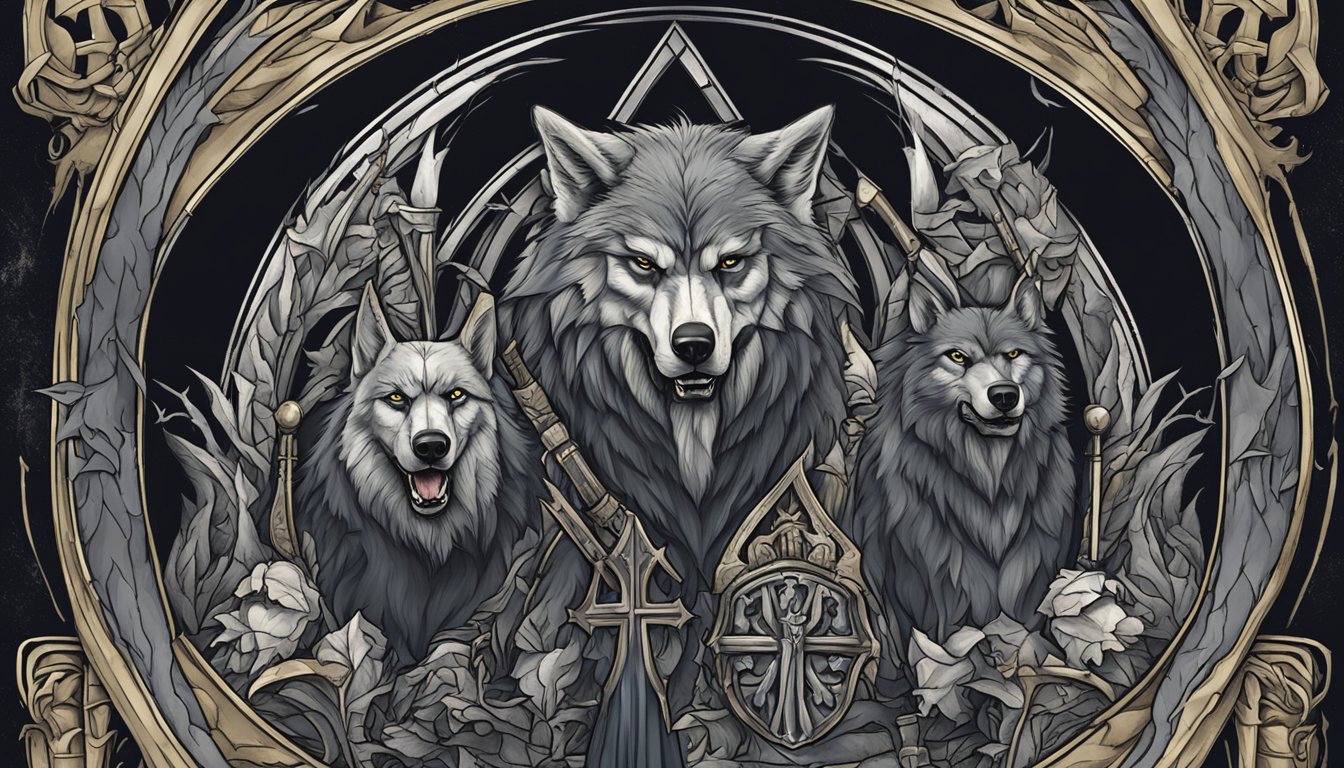Powerwolf is a German power metal band that has gained a significant following since its formation in 2003. With their elaborate costumes, theatrical performances, and religious imagery, the band has sparked debates among fans and critics about whether they are a Christian band or not. While some of their lyrics and imagery may suggest a Christian influence, the band members themselves have stated that they do not consider themselves a Christian band.
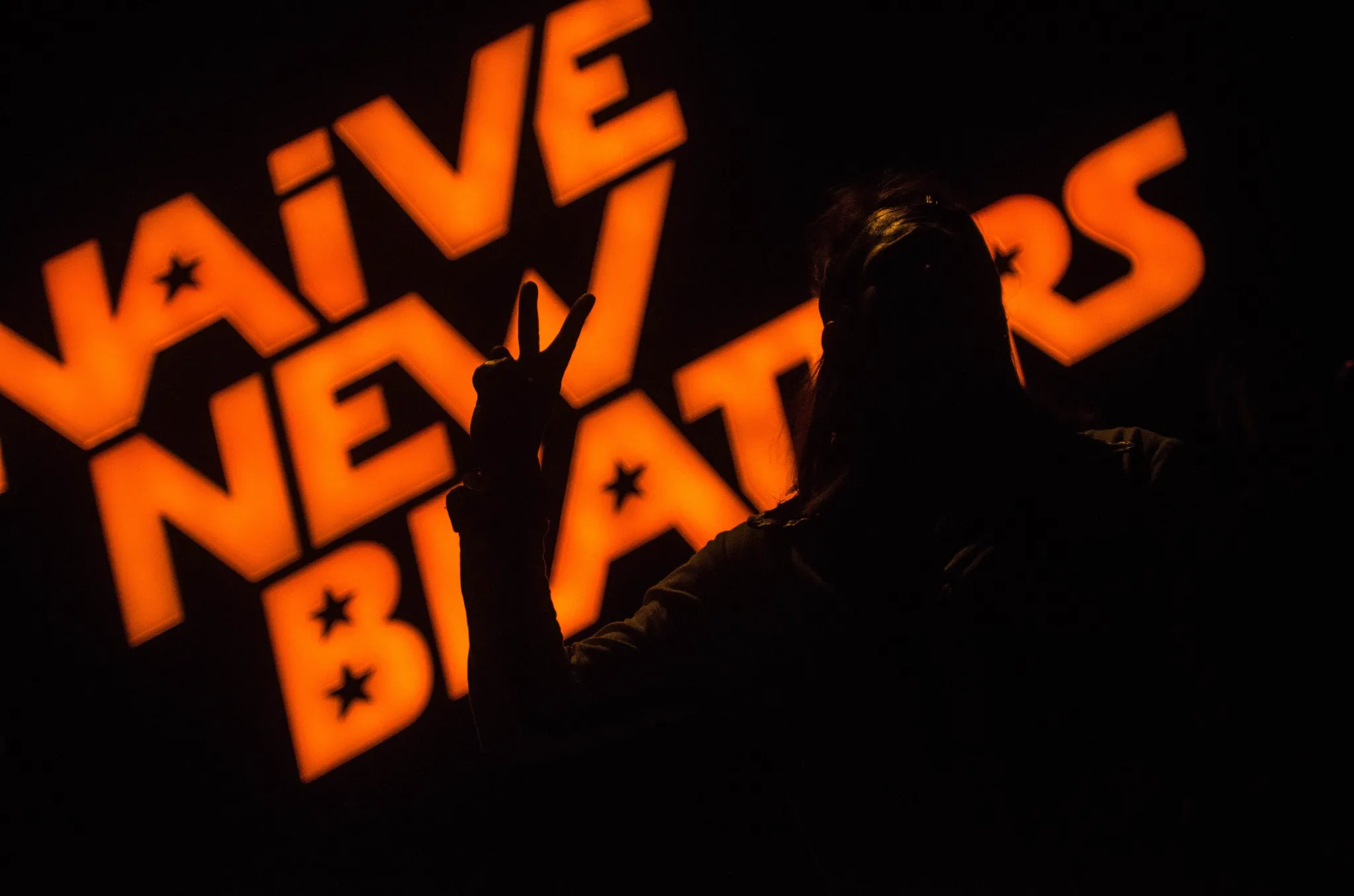
The debate about Powerwolf’s religious affiliation has been going on for years, with fans and critics alike trying to decipher the meaning behind the band’s lyrics and imagery. Some argue that the band’s use of religious symbols and themes is just a part of their theatrical performance, while others believe that there is a deeper meaning behind their music. Despite the controversy, Powerwolf has remained one of the most popular bands in the power metal genre, with a loyal fan base that continues to grow.
Key Takeaways
- Powerwolf is a German power metal band that has sparked debates about whether they are a Christian band or not.
- While some of their lyrics and imagery may suggest a Christian influence, the band members themselves have stated that they do not consider themselves a Christian band.
- Despite the controversy, Powerwolf has remained one of the most popular bands in the power metal genre, with a loyal fan base that continues to grow.
Powerwolf Origins
Formation and Band Members

Powerwolf is a German power metal band that was formed in 2003. The band consists of Falk Maria Schlegel (keyboards), Attila Dorn (vocals), Matthew Greywolf (guitar), Charles Greywolf (bass), and Roel van Helden (drums). The band’s name was inspired by the lyrics of Running Wild’s “Black Hand Inn” album and the concept of werewolves.
The band’s members have a strong background in music. Falk Maria Schlegel and Attila Dorn were previously members of the band Red Aim, while Matthew and Charles Greywolf are brothers who had played together in various bands before forming Powerwolf. Roel van Helden joined the band in 2011, replacing former drummer Stéfane Funèbre.
Musical Style and Influences
Powerwolf’s music is characterized by its fast-paced, energetic style, incorporating elements of power metal, symphonic metal, and gothic metal. The band’s lyrics often draw on religious themes, including references to Christianity and Catholicism, as well as mythology and folklore.
The band has cited a variety of musical influences, including Iron Maiden, Judas Priest, and Manowar. Powerwolf’s sound is also influenced by classical music, particularly the works of Mozart and Beethoven.
In addition to their music, Powerwolf is known for their elaborate stage shows, which often feature religious imagery and theatrical elements. The band’s live performances have been described as “epic” and “over-the-top,” with elaborate costumes and props.
Overall, Powerwolf has become known for their unique blend of heavy metal and religious themes, and their energetic live shows continue to attract a dedicated fan base.
Albums and Discography
Notable Albums
Powerwolf is a German power metal band that has released several albums throughout their career. Their debut album, Return in Bloodred, was released in 2005. The album features tracks such as “Mr. Sinister” and “Lucifer in Starlight” and has been described as a “solid debut” by critics.
Their second album, Lupus Dei, was released in 2007. The album features tracks such as “Saturday Satan” and “Prayer in the Dark” and has been described as “more confident and more powerful” than their debut album.
Powerwolf’s third album, Bible of the Beast, was released in 2009. The album features tracks such as “Raise Your Fist, Evangelist” and “Werewolves of Armenia” and was the band’s first album to chart in Germany, reaching number 76.

Their sixth album, The Sacrament of Sin, was released in 2018. The album features tracks such as “Demons Are a Girl’s Best Friend” and “Fire & Forgive” and has been described as “catchy, anthemic and theatrical” by critics.
Evolution of Sound
Over the years, Powerwolf’s sound has evolved. Their early albums, such as Return in Bloodred and Lupus Dei, were characterized by a more traditional power metal sound, with fast-paced guitar riffs and soaring vocals.
As the band progressed, they began to incorporate more symphonic elements into their music. This is evident on albums such as Bible of the Beast and Blood of the Saints, which feature orchestral arrangements and choirs.
Powerwolf’s more recent albums, such as The Sacrament of Sin and Call of the Wild, have continued to evolve their sound. These albums feature a more polished production and a greater emphasis on melody and hooks.
Overall, Powerwolf’s discography showcases a band that has grown and evolved over the years, while still staying true to their roots. Their unique blend of power metal, symphonic elements, and theatricality has earned them a dedicated fanbase and critical acclaim.
Lyrical Themes and Imagery
« Is YMCA a Christian Organization? Exploring the History and Mission of YMCA
Is Doom a Christian Game? Exploring the Religious Themes in the Classic Shooter »
Powerwolf is a German power metal band known for their unique blend of religious and historical references, fantasy and mythology, and powerful imagery. Their music is characterized by a distinct blend of heavy metal riffs, catchy choruses, and lyrics that explore a range of themes, from religious and historical references to fantasy and mythology.
Religious and Historical References
Powerwolf’s lyrics often contain religious themes and references to Catholicism, sin, and God. For example, their song “Resurrection by Erection” features lyrics such as “Rise up from your grave, like a demon freed from hell” and “Resurrection by erection, raise your phallus to the sky.” These lyrics explore the idea of resurrection and the power of God.
Fantasy and Mythology
In addition to their religious and historical references, Powerwolf’s lyrics also draw upon fantasy and mythology. For example, their song “Werewolves of Armenia” is inspired by the legend of the Beast of Gévaudan, a creature that terrorized the French countryside in the 18th century. The song features lyrics such as “Werewolves of Armenia, we’re hunting for the prey, we’re the call of the wild, we’re the ones to obey.” Powerwolf also draws upon Romanian mythology in their song “In Blood We Trust,” which features lyrics such as “We are the children of the night, the sons of the ancient blood, we are the ones who hold the key to the gates of the otherworld.”
Overall, Powerwolf’s lyrics are a unique blend of religious and historical references, fantasy and mythology, and powerful imagery. Their music is characterized by heavy metal riffs, catchy choruses, and lyrics that explore a range of themes, from religious and historical references to fantasy and mythology.
Cultural Impact

https://www.youtube.com/watch?v=jArVmGEfjdA&embed=true
Fan Base and Reach
Powerwolf has a dedicated fan base that spans across Europe and beyond. They are particularly popular in Germany, where they have headlined festivals such as Metal Mass and played to sold-out crowds. The band has also gained a following in the UK and other parts of the world, with their music reaching a wide audience.
One reason for Powerwolf’s popularity is their unique blend of heavy metal and religious themes. While some listeners may be put off by their use of Christian iconography, others find it refreshing and intriguing. The band’s theatrical live shows, which often feature elaborate costumes and stage props, also add to their appeal.
Influence on Metal Genre
Powerwolf’s impact on the metal genre cannot be overstated. They have been credited with helping to revive the German power metal scene in the early 2000s and have inspired countless other bands with their sound and style.
Their music draws from a wide range of influences, including Iron Maiden, Black Sabbath, and Kiss, but they have managed to create a sound that is uniquely their own. Their use of religious themes and imagery has also influenced other bands in the genre, such as Sabaton.

In addition to their musical influence, Powerwolf has also been recognized by mainstream media outlets such as Metal Hammer. They have been featured on the cover of the magazine multiple times and have been praised for their unique sound and showmanship.
Overall, Powerwolf’s impact on the metal genre and their dedicated fan base demonstrate their cultural significance. While their use of religious themes may be controversial to some, their music and live shows continue to captivate audiences around the world.
Live Performances and Tours
https://www.youtube.com/watch?v=ZGWUdUHpFNs&embed=true
Noteworthy Concerts
Powerwolf is known for their high-energy live performances and engaging stage presence. They often refer to their concerts as “heavy metal masses,” creating an atmosphere that is both theatrical and religious. The band’s unique blend of power metal and religious themes has earned them a dedicated following in the metal community.
One of Powerwolf’s most notable performances was at the Wacken Open Air festival in 2015. The band’s set was praised for its energy and theatrics, with lead vocalist Attila Dorn engaging the crowd and encouraging them to sing along. The performance was later released as a live album, “Alive in the Night,” which showcased the band’s ability to captivate an audience.

Another memorable performance was at the Summer Breeze festival in 2019, where the band delivered a powerful set that included songs from their latest album, “The Sacrament of Sin.” The concert featured a mix of old and new material, with the band showcasing their versatility and musicianship.
Stage Presence and Theatrics
Powerwolf’s live shows are known for their theatricality and engaging stage presence. The band often incorporates religious imagery into their performances, with lead vocalist Attila Dorn dressed in a priest’s robe and carrying a bible. The band’s use of pyrotechnics, lighting, and stage props adds to the overall spectacle of their shows.
Powerwolf’s “Wolfsnächte” tours are particularly noteworthy for their elaborate stage productions. The band’s 2012 tour EP, “Wolfsnächte 2012 – Tour EP,” features live recordings from the tour, showcasing the band’s ability to deliver a powerful and engaging performance.
At their concerts, Powerwolf often encourages audience participation, with Dorn leading sing-alongs and preaching to the crowd. The band’s unique blend of religious themes and heavy metal music has earned them a dedicated following, with fans flocking to their concerts to experience the spectacle firsthand.
In conclusion, Powerwolf’s live performances and tours are a testament to their unique blend of religious themes and heavy metal music. The band’s engaging stage presence, use of theatrics, and dedication to their craft have earned them a reputation as one of the most exciting live acts in the metal community.
Band Identity and Public Image

https://www.youtube.com/watch?v=rYJQGSapz-A&embed=true
Powerwolf is a German power metal band that was formed in 2003. The band’s visual aesthetics and costumes are an integral part of their identity. They are known for their elaborate stage shows and gothic-inspired attire, including leather, spikes, and other dark materials. The band members also wear black and white face paint, which has become a recognizable aspect of their image.
Visual Aesthetics and Costumes
Powerwolf’s visual aesthetics and costumes have been a subject of interest among fans and critics alike. The band’s use of religious imagery, such as crosses and other Christian symbols, has led to some controversy. However, the band members have stated that their use of religious imagery is not meant to be taken seriously and is instead used for theatrical purposes.
Public Perception and Humor
Powerwolf’s public perception is often associated with their use of humor in their music and performances. The band’s lyrics often contain tongue-in-cheek references to religion and mythology, which has led some to question their sincerity. However, the band members have stated that their use of humor is meant to be lighthearted and not meant to offend anyone.
In terms of their religious identity, Powerwolf is not a Christian band. While they use Christian imagery in their music and performances, it is done for theatrical purposes rather than as a reflection of their personal beliefs. The band’s members have stated that they do not identify with any particular religion and that their music is meant to be enjoyed by everyone, regardless of their beliefs.

Overall, Powerwolf’s identity and public image are a reflection of their theatrical and humorous approach to music. While their use of religious imagery may be controversial, it is done in a friendly and non-offensive manner. The band’s fans include both Christians and non-Christians, and their music is enjoyed by people of all backgrounds and beliefs.
Collaborations and Side Projects
Associated Acts
Powerwolf members have been involved in a number of collaborations and side projects over the years. For instance, prior to forming Powerwolf, the Greywolf brothers were members of Red Aim, a stoner rock band. The band was formed in 1999 and released four albums before disbanding in 2008.
Charles Greywolf has also been involved in Mystic Prophecy, a German power metal band. He played bass on their 2003 album “Regressus” and also contributed to their 2006 album “Savage Souls”.
Falk Maria Schlegel, the keyboardist for Powerwolf, has also been involved in a number of side projects. He played keyboards on Stormwarrior’s 2008 album “Heading Northe” and on Lonewolf’s 2012 album “The Fourth and Final Horseman”.

In addition, Schlegel has collaborated with Eluveitie, a Swiss folk metal band. He played bagpipes on their 2012 album “Helvetios” and also contributed to their 2014 album “Origins”.
Despite these collaborations and side projects, Powerwolf remains the primary focus for all of its members.
Controversies and Misconceptions
https://www.youtube.com/watch?v=lxenOg4pqCo&embed=true
Christian Band Debate
Powerwolf has often been debated as to whether they are a Christian band or not. While some of their lyrics and imagery may have religious connotations, the band members themselves have stated that their music is not intended to be religious in nature. In an interview with Loudersound, lead vocalist Attila Dorn stated that “their religion is metal.”
Despite this, some listeners have still questioned the band’s intentions. In response, Powerwolf has stated that they use religious imagery in a humorous way, as a nod to the theatricality of heavy metal music. In the same Loudersound interview, Dorn explained that “when we formed Powerwolf we found out that we were all, in a morbid way, fascinated with the visuals. The cathedrals, the liturgy, all of these things, so we started to integrate them because they felt natural to us.”

It is important to note that the use of religious imagery in heavy metal music is not uncommon. Many bands, such as Iron Maiden and Black Sabbath, have used religious themes in their music and imagery. However, this does not necessarily mean that these bands are promoting any particular religious ideology.
In conclusion, while Powerwolf may use religious imagery and themes in their music, they are not a Christian band. The band members themselves have stated that their music is intended to be humorous and theatrical, rather than religious in nature. It is important to understand the context in which religious imagery is used in heavy metal music, and not jump to conclusions about the intentions of the artists.
Powerwolf’s Influence on Fans
https://www.youtube.com/watch?v=54_WJvx7DoE&embed=true
Community and Spirituality
Powerwolf’s music has attracted a diverse fan base, including those who identify as Christian and those who do not. Despite the band’s use of religious imagery and themes, their fans come from all walks of life and have formed a tight-knit community around their music.
Many fans have found a sense of spirituality and connection to their faith through Powerwolf’s music. The band’s use of religious iconography and themes can be seen as a way to explore and celebrate spirituality in a unique and unconventional way. Some fans have even reported feeling a sense of transcendence during Powerwolf’s live shows, which often feature a “Heavy Metal Mass” that incorporates religious elements.

However, it’s important to note that not all of Powerwolf’s fans are religious or spiritual. Some simply enjoy the band’s music and theatrics, while others are drawn to the sense of community and acceptance that the fan base provides.
Overall, Powerwolf’s music has had a profound impact on their fans, both in terms of their spirituality and their sense of community. Whether you’re a devout Christian or simply a fan of heavy metal, there’s something in Powerwolf’s music that speaks to all who listen.
Future Directions and Endeavors
New Material and Aspirations
Powerwolf has been keeping their fans on their toes with their latest album, Call of the Wild, which was released in 2021. The album, which features 11 tracks, has been received positively by fans and critics alike. With the success of Call of the Wild, fans are eagerly anticipating new material from the band.
Powerwolf has not announced any new albums as of yet, but the band has expressed their desire to continue making music and touring. In an interview with Louder, guitarist Matthew Greywolf stated that the band has “a lot of ideas for new songs” and that they are “always writing and thinking about new material.”
In addition to new material, Powerwolf has also expressed their aspirations to tour extensively. The band has a loyal following and has toured extensively in the past. With the release of their latest album, fans are hoping that Powerwolf will announce new tour dates soon.
Overall, Powerwolf’s future looks bright. With their latest album, Call of the Wild, receiving positive reviews, and the band’s desire to continue making music and touring, fans can expect great things from the band in the future.
Frequently Asked Questions
What are the religious beliefs of Powerwolf members?
Powerwolf is a German power metal band that has been active since 2003. While the band’s lyrics often touch on religious themes and imagery, they do not consider themselves a religious band. In an interview with Loudersound, Matthew Greywolf, the band’s guitarist, stated that “I am a metalist, a metal fan. Metal is my religion.”
Does Powerwolf’s music reflect Christian themes?
Yes, Powerwolf’s music often includes Christian themes and imagery, as well as references to ancient Romanian legends. However, the band has stated that they do not consider themselves a Christian band. Some fans have speculated that the religious themes in their music are done ironically.
How does Powerwolf approach religious imagery in their lyrics?
Powerwolf’s approach to religious imagery in their lyrics is often theatrical and bombastic, with operatic vocals and epic guitar riffs. The band has stated that they are inspired by the imagery and symbolism of the Catholic Church, as well as ancient Romanian legends.
Are there any Christian metal bands similar to Powerwolf?
There are several Christian metal bands that share some similarities with Powerwolf, such as Sabaton and HammerFall. These bands also incorporate epic, bombastic themes and imagery in their music, but with a more overtly Christian message.
What genre of metal does Powerwolf primarily play?
Powerwolf primarily plays power metal, a subgenre of heavy metal that emphasizes speed, melody, and epic themes. The band’s music is characterized by fast-paced guitar riffs, soaring vocals, and symphonic orchestration.
Can Powerwolf’s music be considered appropriate for Christian audiences?
While Powerwolf’s music often includes Christian themes and imagery, the band has stated that they do not consider themselves a Christian band. Some fans have criticized the band for their use of religious imagery in a secular context. Ultimately, whether or not Powerwolf’s music is appropriate for Christian audiences is a matter of personal interpretation.

